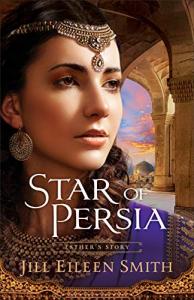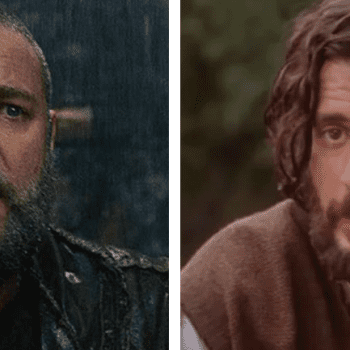 Time for a quick update on a few TV shows with biblical themes that are currently in the works.
Time for a quick update on a few TV shows with biblical themes that are currently in the works.
–
First, Deadline reports that M.E.G.A. Films is developing an adaptation of Jill Eileen Smith’s novel Star of Persia, which tells the story of Esther and King Xerxes:
Star of Persia is inspired by the Old Testament’s Book of Esther, following a brave peasant girl, Esther, who is enslaved by Persian King Xerxes, and forced to be a part of his harem. There, as she works to gain the trust and respect of the other women in the palace, she fights to become their protector and advocate. Now rising to wield great power as the King’s favorite concubine, she discovers a deadly coup among his most trusted advisors. On the heels of his army’s costly victory over the Spartans at the Battle of Thermopylae (as seen in Zack Snyder’s 300), Esther must decide whether to expose and foil the plot, or become complicit in the downfall of an empire.
I have not read Star of Persia, but the reference to the “deadly coup” sounds like a reference to the conspiracy that Esther’s cousin Mordechai discovers in Esther 2:21-23:
During the time Mordecai was sitting at the king’s gate, Bigthana and Teresh, two of the king’s officers who guarded the doorway, became angry and conspired to assassinate King Xerxes. But Mordecai found out about the plot and told Queen Esther, who in turn reported it to the king, giving credit to Mordecai. And when the report was investigated and found to be true, the two officials were impaled on poles. All this was recorded in the book of the annals in the presence of the king.
That conspiracy is just a tiny part of the book of Esther, though, the bulk of which concerns a plot by Haman to kill all of the Jews in the Persian Empire.
I don’t know if the novel gets into Haman’s attempted genocide, nor do I know whether the film would cover that part of the story even if the novel did include it, but I’d be surprised if they didn’t. Maybe the “deadly coup” mentioned in the summary includes Haman’s plot, even though he didn’t (knowingly) target anyone in the palace?
Then again, it could be interesting to see a movie about Esther that didn’t focus on the same things that all of the other movies about Esther have focused on.
Incidentally, Smith specializes in novels about women from the Bible, including the Wives of the Patriarchs series, the Daughters of the Promised Land series, the Wives of King David series, the Loves of King Solomon series, and Miriam’s Song.
–
Second, Variety reported a couple months ago that Lux Vide, the Italian studio behind the ‘Bible Collection’ series of TV-movies and miniseries, was developing yet another series about Jesus — this time with a “human, secular” twist — called The Rising.
I didn’t cover this news at the time because I wasn’t entirely sure how much I could trust it: the story appeared the day before Good Friday, which happened to be April Fool’s Day, and I wondered if it might be some sort of prank. But I have since seen the project acknowledged on the official Lux Vide website, so it appears to be legit.
Interestingly — given that The Chosen just became the first multi-season series about Jesus — The Rising is conceived as a three-season series itself, with the first season focusing on the ministry of Jesus, the second season focusing on the week of his death and resurrection, and the third season focusing on “the fate of the 12 Apostles”.
From Variety’s interview with Lux Vide CEO Luca Bernabei, who describes the apostles as, at least initially, a “‘band of rogue teenagers’ rebelling against injustices of the time”:
If the first and third seasons chart the choice and fate of the Apostles, that will allow you to drill down into their characters?
Yes, the choice must have been quite a good one if you believe that these 12 people, just a dozen, spread Jesus’ teachings all over the world. And Jesus didn’t make obvious choices, those with the best academic qualifications as it were. Paul was a cultivated rich Jew, a carpet maker. But Peter was a fisherman from Galilee.
And Judas?
Judas was not a bad person in my opinion. But he was a zealot. He wanted Jesus to be a political leader and wouldn’t follow him if he wasn’t.
Interestingly, at least two other projects about what the apostles did after the ministry of Jesus were announced a few months ago, one produced by Martin Scorsese and Paul Schrader, and the other produced by Mark Burnett and Roma Downey.
–
Finally, I learned the other day — following the cancellation of superhero series Jupiter’s Legacy — that Netflix is currently developing adaptations of Mark Millar’s other comic books, including American Jesus, which I’ve mentioned a few times at this blog.
The comic, which follows a modern 12-year-old boy who realizes he is the second coming of Christ, was previously acquired by Waypoint Entertainment in 2016, as I mentioned at the time — but apparently the rights were picked up by Netflix just a year or two later, and Netflix announced their intention to make an American Jesus series in 2018, at the same time that they announced they were making an adaptation of Jupiter’s Legacy.
Jupiter’s Legacy finally came out last month and, apparently, didn’t get the viewership numbers that Netflix was looking for. American Jesus, meanwhile, has its own page at the Netflix website but it doesn’t seem to have any cast or crew attached to it yet.
Interestingly, American Jesus is not the only teenaged-Jesus project that Netflix has toyed with. Four years ago, Orange Is the New Black creator Jenji Kohan said she had been developing a “teen Jesus” series that she described as “like The Wonder Years, but with Jesus.” But I haven’t heard any news on that front in a long time, either.
–
Incidentally, fans of Lux Vide’s ‘Bible Collection‘ series might be interested in this story that Luca Bernabei, the company’s current CEO, tells about his father getting Richard Harris to star in Abraham, one of the first movies in that series:
“The Rising” can be seen a homage to your father, Ettore Bernabei, who helped produce “The Bible” (“La Bibbia”)….
Yes. This series is very personal and will carry on the company tradition of creating the highest-quality of family drama begun by my late father. “The Bible” was one of the highest-rated and globally-acquired miniseries of all time and involved a groundbreaking international collaboration of producers and all star-cast.
“The Bible” helped launch Lux Vide and was made over 1993-2002. What’s changed in TV production since?
It’s like another geological age. Having a longer series, we can drive deeper into character. And the series will be much faster. Daniel, the showrunner, created and wrote “Carnivàle.” And music is going to be much more important, given it’s so important for a younger generation.
What hasn’t changed is personal passion, making series that come from the heart….
No, that hasn’t changed at all. My father, for example, went to New York to try to persuade Richard Harris to play Abraham in “The Bible.” He hadn’t done TV before and didn’t want to do it. And my father didn’t speak a word of English. But as luck or destiny would have it, there was a snow storm in New York and no taxis so Harris was stuck in his hotel. So my father decided to walk in the snow to his hotel. He was 73 years old!
He still has to convince Harris to do it…
He waited for him in the lobby and when Harris came down, with somebody translating, he started to tell him the story of Abraham. After a while Harris looked at my father – he came from an Irish Catholic family – and said: ‘You know you remind me of my grandmother who used to tell me stories from the Bible when she put me to bed. So in honor and respect of my grandmother, I’ll do it.’ I’ve had many maestros in my life, but the first was my father.
Harris must have liked the experience well enough, because he came back to star as the apostle John in the final entry in the series, The Apocalypse, nine years later.













